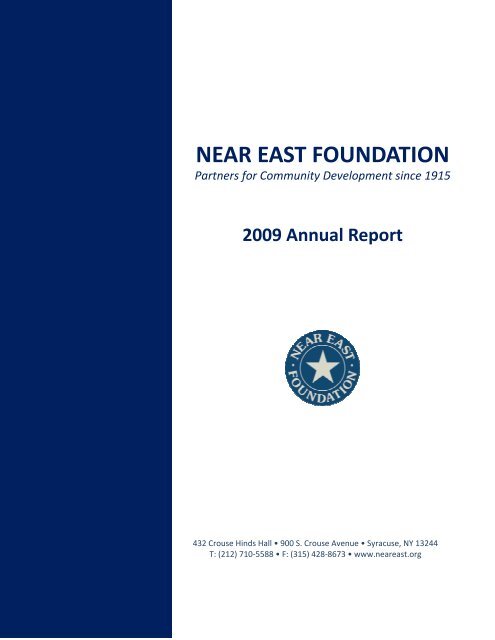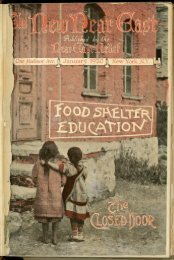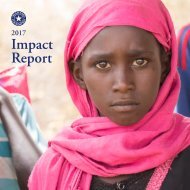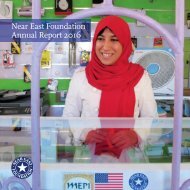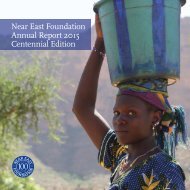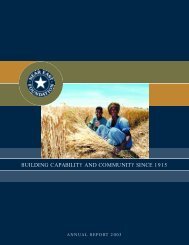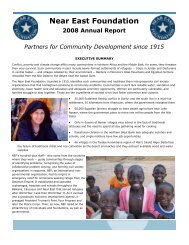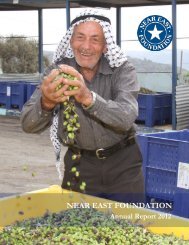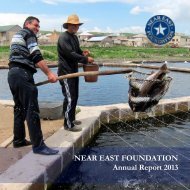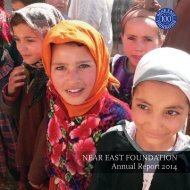Near East Foundation 2009 Annual Report
You also want an ePaper? Increase the reach of your titles
YUMPU automatically turns print PDFs into web optimized ePapers that Google loves.
NEAR EAST FOUNDATION<br />
Partners for Community Development since 1915<br />
<strong>2009</strong> <strong>Annual</strong> <strong>Report</strong><br />
432 Crouse Hinds Hall • 900 S. Crouse Avenue • Syracuse, NY 13244<br />
T: (212) 710-5588 • F: (315) 428-8673 • www.neareast.org
<strong>Near</strong> <strong>East</strong> <strong>Foundation</strong><br />
<strong>2009</strong> <strong>Annual</strong> <strong>Report</strong><br />
For 95 years, the <strong>Near</strong> <strong>East</strong> <strong>Foundation</strong> (NEF) has worked to improve conditions of the most vulnerable<br />
communities in the Middle <strong>East</strong> and Africa. Their vulnerability is rooted in chronic poverty, conflict,<br />
migration and climate change. In 1915, NEF was created to provide refuge and relief to Armenians facing<br />
persecution during the disintegration of the Ottoman Empire. Today, the vulnerable communities with<br />
which NEF works take many forms:<br />
Marginalized social groups – young people in Morocco’s peri-urban slums, residents of “poverty<br />
pockets” in rural Jordan;<br />
Villages isolated by their environment – Berbers in Morocco’s Atlas Mountains, Malians facing an<br />
encroaching desert, Egyptian farmers relocated from the Nile Delta, and rural Armenians cut off<br />
from economic opportunity; and<br />
People fleeing conflict – Iraqis in Jordan and Syria, Palestinians in the West Bank and Darfurians in<br />
central Sudan.<br />
What these groups hold in common is that they are excluded from opportunities for economic and social<br />
advancement taking place around them. They lack the power to influence public decision-making and<br />
access to educational opportunities. They are left behind, caught in “poverty traps” that prevent them<br />
from investing in their own economic or social development.<br />
KNOWLEDGE, VOICE, AND ENTERPRISE. NEF assists its local partners to participate more fully in the<br />
development of their countries—to build the lives they envision for themselves. Through a range of<br />
training, technical assistance and material support, NEF helps vulnerable communities:<br />
Access KNOWLEDGE necessary to participate fully in civic and economic life through education, job<br />
training, and literacy programs<br />
Amplify their collective VOICE through community organizing and institutional strengthening<br />
initiatives<br />
Create ECONOMIC OPPORTUNITY through enterprise development, micro-credit, and improved<br />
agricultural and natural resource management<br />
THE NEAR EAST FOUNDATION DIFFERENCE. With an annual budget of approximately $6 million, NEF<br />
maintains offices and programs in Armenia, Egypt, Jordan, Mali, Morocco, Palestine and Sudan. In the field,<br />
approximately 85 NEF staff members—all of whom are from the countries in which they work—work<br />
closely with local organizations to mobilize vulnerable communities to find homegrown solutions to their<br />
problems. A small staff based in the US provides program development, project management, and<br />
administrative support to teams in the field. NEF is particularly effective at working in difficult settings for<br />
several reasons:<br />
<strong>Near</strong> <strong>East</strong> <strong>Foundation</strong> * 432 Crouse Hinds Hall * 900 S. Crouse Avenue * Syracuse, NY 13244 * T: (212) 710-5588 * F: (315) 428-8673
Decentralization. NEF’s decentralized structure empowers local development professionals. Most<br />
of our technical capacity and programming capacity resides with the teams in the field. This allows<br />
NEF to design initiatives that are especially responsive to local need and tailored to local conditions.<br />
Our field programs evolve organically with the changing nature of local development challenges, as<br />
reflected in the growing importance of urban poverty reduction initiatives in Morocco (Casablanca),<br />
Egypt (Cairo), and Jordan (Zarqa).<br />
Relationships. NEF has sustained its presence in partner countries and communities over many<br />
years. These long-term relationships give us intimate knowledge of local circumstances and<br />
challenges. Just as important, the relationships and NEF’s local reputation are a foundation for trust<br />
with groups that are often difficult to reach—such as residents of remote villages in Morocco’s High<br />
Atlas Mountains, refugees in urban Jordan, and Palestinian farmers in the West Bank.<br />
Innovation. NEF’s local capacity and long-standing relationships enable NEF to pilot and refine<br />
innovative solutions to local development challenges. While our activities are rooted in grassroots<br />
action, the approaches and tools we develop gain traction far beyond the communities in which we<br />
work. For example, local natural resource management bylaws, developed by NEF and its partners<br />
in northern Mali, are now common elements of development practice throughout West Africa.<br />
NEF’s locally adapted models for micro-credit and small enterprise development are now widely<br />
used by NGOs throughout Jordan. And NEF’s model of engaging communities to increase girls’<br />
education, piloted in a handful of villages in the High Atlas Mountains, is now used across southern<br />
Morocco and is on the cusp of expansion to the national level.<br />
<strong>2009</strong> ACHIEVEMENTS. NEF’s interventions are designed to address challenges associated with<br />
knowledge, voice, and enterprise in a sustained and holistic manner. The following examples illustrate<br />
our achievements in <strong>2009</strong>.<br />
VOICE<br />
Many of NEF’s local partners have been excluded from public decision-making due to poverty, lack of<br />
education, or geographic isolation. They have no seat at the table, and their lack of political power is both<br />
cause and effect of vulnerability. NEF helps establish and strengthen local organizations so they can take<br />
collective action and represent their members more effectively.<br />
Morocco Urban Youth Development. Under a 3-year cooperative agreement with the US Agency for<br />
International Development (USAID), NEF is supporting the formation of youth associations in some of the<br />
most difficult peri-urban slums in Casablanca. These associations provide a vehicle for young people to<br />
communicate their problems and aspirations and to play a more active role in their communities. NEF has<br />
trained 150 young people in leadership and supported 18 youth committees.<br />
<strong>Near</strong> <strong>East</strong> <strong>Foundation</strong> * 432 Crouse Hinds Hall * 900 S. Crouse Avenue * Syracuse, NY 13244 * T: (212) 710-5588 * F: (315) 428-8673
Girls Education (Morocco). A cornerstone of NEF’s approach to<br />
girls’ education in rural Morocco is leadership from Parent-<br />
Teacher Associations. With support from the US Middle <strong>East</strong><br />
Partnership Initiative (MEPI), NEF has helped revive and<br />
strengthen 38 PTAs across southern Morocco and increased<br />
parental participation by 50 percent. NEF has supported income<br />
generating projects in 12 of these communities, which now earn<br />
profits of $30,000 annually to invest in their schools.<br />
Local Economic Development (Jordan). With support from<br />
Jordan’s Ministry of Planning and International Cooperation, NEF<br />
is managing a $4.23 million project to stimulate economic development in six of the poorest regions of<br />
Jordan. In partnership with the royal NGO, JOHUD, NEF trains local community associations in<br />
organizational management and economic development. These associations then catalyze and guide<br />
activities to stimulate local economic growth and to support social and physical infrastructure.<br />
KNOWLEDGE<br />
Without basic knowledge, urban and rural poor alike have little prospect of taking advantage of new<br />
opportunities for employment and self-improvement. Their poverty and vulnerability to exploitation<br />
persists—often while society around them prospers. NEF education and training programs increase access<br />
to the basic knowledge needed to participate more fully in civic life and take advantage of economic<br />
opportunities.<br />
Girls Education (Morocco). Since 2004, NEF has spearheaded a<br />
bold initiative to increase girls’ attendance and overall school<br />
retention in some of the most remote villages in rural<br />
southern Morocco. Through a strategy of community<br />
mobilization, strengthening of parent teacher associations,<br />
curricular reform, infrastructure improvement, and revenue<br />
generation, NEF has helped increase girls’ primary school<br />
attendance from 50 percent to 98 percent and increased<br />
primary school completion for all children from 10 percent to<br />
95 percent.<br />
Kindergarten Development (Palestinian Territories). In collaboration with international and local NGO’s,<br />
NEF is leading a comprehensive program to improve kindergarten education in the West Bank, including<br />
curriculum, teacher training and infrastructure development. We continued our three-year collaboration<br />
with the World Food Program to supplement the nutrition of Palestinian school children. Through this<br />
program, NEF delivers enriched WFP commodities to twenty-four women’s enterprise centers where 2,000<br />
women produce enriched snacks for distribution to kindergartens and primary schools. The program serves<br />
<strong>Near</strong> <strong>East</strong> <strong>Foundation</strong> * 432 Crouse Hinds Hall * 900 S. Crouse Avenue * Syracuse, NY 13244 * T: (212) 710-5588 * F: (315) 428-8673
approximately 54,000 students in 189 kindergartens and 100<br />
primary schools in the northern and central West Bank. With<br />
support from the US, Danish and Sharjah (AUE) governments,<br />
NEF renovated sanitary facilities, playgrounds and classrooms<br />
in several kindergartens.<br />
Reproductive Health (Egypt). In four diverse communities<br />
across Egypt, NEF works with highly vulnerable 12-18 year-old<br />
Egyptian who live on the street or are forced to work to<br />
provide income for their families. Misconceptions about<br />
sexuality are widespread among adolescents and youth, and sexual practices put their reproductive and<br />
general health at risk. With support from the Ford <strong>Foundation</strong>, NEF is helping improve the quality of health<br />
and well-being among poor urban youth through training in leadership, life skills, and sexuality.<br />
Economic Opportunity<br />
NEF helps vulnerable people gain the knowledge and skills to earn a meaningful living and lift themselves<br />
out of poverty. We achieve this through technical assistance to improve productivity, job training, business<br />
development training, and micro-credit. Our approach to creating economic opportunity takes many<br />
forms—agriculture and natural resource management, value added processing, small-scale commerce, and<br />
local service delivery—reflecting the social and economic realities of our local partners.<br />
Micro-Economic Development (Armenia). NEF returned to<br />
Armenia in January <strong>2009</strong> to launch a comprehensive microeconomic<br />
development and job creation program in Tavush<br />
Marz and Gegharkunik Marzes. In partnership with Armenia<br />
Fund USA and local organizations, NEF’s integrated approach<br />
to local economic development in rural Armenian villages<br />
employs technical support for micro-enterprise, microcredit<br />
for small businesses, and micro-franchising for sectors that<br />
have high-potential at a regional level. In this pilot phase, NEF<br />
supported initial sector/competitiveness analyses, business<br />
development training for 53 small entrepreneurs, and<br />
assistance in preparing 35 business plans in areas as diverse as<br />
livestock, fish farming and fruit and vegetable production.<br />
Agriculture and Natural Resource Management (Mali). Since<br />
early 2008, with support from the Dutch NGO NOVIB, NEF has<br />
assisted the inhabitants of 46 villages to cope with changes in<br />
rainfall, temperature and river flow in Mali’s inland delta. The<br />
project introduced measures for improved natural resource<br />
<strong>Near</strong> <strong>East</strong> <strong>Foundation</strong> * 432 Crouse Hinds Hall * 900 S. Crouse Avenue * Syracuse, NY 13244 * T: (212) 710-5588 * F: (315) 428-8673
management to approximately 50,000 people from diverse groups (farmers, herders, fishermen, and<br />
artisans), local government officials and local NGO staff members. NEF works with producers to improve<br />
farm efficiency, increase productivity, and expand marketing and distribution channels, with a focus on<br />
improving competitiveness in the agricultural sector and supporting sustainable increases in production.<br />
Urban Youth Development (Morocco). NEF provides leadership and job skills training in partnerships with<br />
local firms to improve employment opportunities for resident youth. NEF also provides training and<br />
facilitates micro-credit to help out-of-school youth develop small enterprises. Through June <strong>2009</strong>, NEF<br />
trained 150 young men and women in life skills and leadership, placed 20 people in internships, helped<br />
prepare business plans and credit applications for 40 small enterprises, and established an SMS-based<br />
employment information system for use by 600 youth.<br />
Women’s Micro-credit (Mali). NEF has improved the financial<br />
security of thousands of people in the Mopti region by<br />
providing them with vocational training and access to credit.<br />
NEF established a women’s micro-finance bank, Nayral/NEF,<br />
which is now run as an independent financial institution.<br />
Nayral/NEF has lent $5.3 million to approximately 25,000<br />
women to support small and medium businesses, with a<br />
repayment rate of 98 percent. NEF continues to give<br />
management assistance and provide some loan guarantees.<br />
Agricultural Development (Egypt). Since 2005, NEF has<br />
operated a pilot agriculture extension project in three villages<br />
in the southwestern desert. The Egyptian government plans to<br />
resettle one million people to this area over the next ten years.<br />
NEF’s project includes a nursery and experimental fields, where<br />
2,500 participating farming families select appropriate<br />
varieties, seeds, planting cycles and methods and fertilizer and<br />
pesticide use. NEF emphasizes an ecological approach to<br />
agriculture, along with value-added production and access to<br />
markets. NEF has helped producers of high-value horticultural<br />
products obtain access to European markets through training and technical assistance to meet EUREPGAP<br />
standards.<br />
Local Economic Development (Jordan). NEF worked with residents, private sector consultants, and<br />
Government of Jordan authorities to assess potential investments to jump-start economic activity in rural<br />
“poverty pockets.” NEF provides training in business development and management and works through<br />
community associations to create new businesses in agriculture and commerce. NEF manages a grant fund<br />
and provides lending facilities for entrepreneurs.<br />
<strong>Near</strong> <strong>East</strong> <strong>Foundation</strong> * 432 Crouse Hinds Hall * 900 S. Crouse Avenue * Syracuse, NY 13244 * T: (212) 710-5588 * F: (315) 428-8673
REACHING THE MOST VULNERABLE<br />
The most vulnerable—refugees and internally displaced people (IDPs)—often require a combination of<br />
direct relief and long-term development efforts. NEF’s work to bridge the relief-to-development transition<br />
goes back to our earliest days. Frequently, one of the biggest challenges is simply identifying and reaching<br />
out to these communities. For example, Iraqi refugees in Jordan disappear into the communities in which<br />
they resettle. Unable to work legally or to access social services such as schools and clinics in some cases,<br />
they exist in economic limbo or accept illegal work that exposes them to a variety of threats. The<br />
communities with which they find refuge are themselves in great need, and special care must be taken to<br />
address the specific needs of refugees while also reaching out to their host communities. This is the case<br />
with Iraqi refugees in both Jordan and Syria.<br />
Internally Displaced People (Sudan). In Sudan, NEF works with<br />
refugees from Darfur and the war-torn South who have found<br />
refuge in the dusty village of Dar es-Salam, 40 kilometers from<br />
Khartoum. NEF built and continues to support a clinic that is<br />
the sole source of healthcare for this community of 40,000<br />
people. The clinic currently serves over 1,000 patients per<br />
month by providing general treatment, laboratory testing, preand<br />
post-natal care, vaccination and nutrition and HIV/AIDS<br />
awareness activities.<br />
Iraqi Refugees (Jordan). NEF partnered with six community-based organizations in Jordan’s second largest<br />
city, Zarqa, to provide relief aid, social services, and psycho-social support for Iraqi refugees and Jordanian<br />
host communities. NEF and its local partners were able to deliver targeted humanitarian assistance to over<br />
2,000 households (about 10,000 people), 62% of which were Iraqi refugees. NEF coordinated 13<br />
humanitarian relief campaigns and three sustainable community service projects--beauty salon and<br />
industrial sewing classes for women, an indoor playground for children, and a computer and cell phone<br />
maintenance training center for men.<br />
Iraqi Refugees (Syria). In Syria, NEF undertook a<br />
comprehensive effort to enable Iraqi refugee and vulnerable<br />
Syrian women and girls to stabilize their well-being and<br />
livelihoods. With support from private foundations in the US<br />
and in coordination with the Center for Development Services,<br />
the Syrian Ministry of Health and the Syrian Women's General<br />
Union, NEF provided reproductive health and alternative<br />
livelihood programs to female Iraqi refugees in Damascus,<br />
seeking to reduce prostitution and forced labor. NEF<br />
conducted 145 reproductive health awareness sessions for<br />
327 participants and trained Syrian doctors and nurses, as well as Iraqi volunteers, to conduct the<br />
workshops and provide ongoing counseling. NEF and its partners conducted psycho-social counseling<br />
<strong>Near</strong> <strong>East</strong> <strong>Foundation</strong> * 432 Crouse Hinds Hall * 900 S. Crouse Avenue * Syracuse, NY 13244 * T: (212) 710-5588 * F: (315) 428-8673
sessions and group therapy for 171 Iraqi women and adolescent girls in areas such as pervasive domestic as<br />
well as sexual and gender-based violence. To support alternative livelihoods, NEF and its partners<br />
conducted five training workshops on small business development for 124 beneficiaries.<br />
BOARD OF DIRECTORS<br />
Shant Mardirossian, Chair<br />
Shahnaz Batmanghelidj, Vice-Chair<br />
Alexander Papachristou, President<br />
Ronald E. Miller, Treasurer<br />
Haig Mardikian, Secretary<br />
Charles E. Benjamin, Ph.D.<br />
Amir Ali Farman-Farma, Ph.D.<br />
Johnson Garrett<br />
John Goelet<br />
John Grammer<br />
John M. Kerr, Ph.D.<br />
David W. Mize<br />
Abe Moses<br />
Thomas D. Mullins<br />
Richard Robarts<br />
Timothy Rothermel<br />
Michaela Walsh<br />
Anthony Williams<br />
Tarek Younes<br />
PRESIDENT'S COUNCIL<br />
H.E. André Azoulay<br />
Ambassador Edward P. Djerejian<br />
Vartan Gregorian, Ph.D.<br />
Linda K. Jacobs, Ph.D.<br />
Ambassador Richard W. Murphy<br />
Her Majesty Queen Noor of Jordan<br />
Ambassador Frank G. Wisner<br />
<strong>Near</strong> <strong>East</strong> <strong>Foundation</strong> * 432 Crouse Hinds Hall * 900 S. Crouse Avenue * Syracuse, NY 13244 * T: (212) 710-5588 * F: (315) 428-8673
Statement of Financial Position at June 30, <strong>2009</strong> Statement of Activities Year ended June 30,<strong>2009</strong><br />
ASSETS<br />
REVENUES & OTHER SUPPORT<br />
Cash & equivalents 969,423 Contributions 1,017,476<br />
Grants & Contracts receivable 169,391 Government 894,790<br />
Accounts & loans receivable 606,102 Private Grants 2,014,039<br />
Investments & investments in trust 530,427 In Kind Contributions 245,132<br />
Other current assets 44,320 Program related 260,589<br />
Fixed assets net 94,573 Other including investment (83,028)<br />
2,414,236 4,348,998<br />
LIABILITIES & NET ASSETS<br />
EXPENSES<br />
Current liabilities Program Services 4,623,430<br />
Accounts payable & accrued expenses 531,667 Management & General 736,852<br />
Refundable advances 139,333 Fund-raising 265,598<br />
671,000 5,625,880<br />
Net Assets Net Surplus (1,276,882)<br />
Unrestricted 686,653<br />
Temporarily restricted 721,198<br />
Permanently restricted 335,385<br />
Total net assets 1,743,236<br />
Total 2,414,236<br />
<strong>Near</strong> <strong>East</strong> <strong>Foundation</strong> * 432 Crouse Hinds Hall * 900 S. Crouse Avenue * Syracuse, NY 13244 * T: (212) 710-5588 * F: (315) 428-8673


